- Home
- George Orwell
A Collection of Essays Page 4
A Collection of Essays Read online
Page 4
December 19th. A gas-lamp burning behind the glass door of a concierge's room at the end of a winter's day, with darkness overhead -- what a lovely opening for a novel! Today, for a whole hour, I had nothing but this admirable picture in my mind.
February 2nd. At Versailles. . . . As I looked at the ivy-leaves with their dainty pale yellow borders, I had a moment of sadness at the thought that, till my life's end, things as lovely as they will be there for me to see and I shall have no time to describe them.
He writes much of his work, and his difficulties with his work (like the majority of writers he never feels in the mood for writing, and yet his books somehow get finished), of his dreams, which seem to affect his waking life considerably, and of his remembered childhood in the golden age "before the war". Nearly all his thoughts have a nostalgic tinge. But what gives them their special interest is that he is far too intelligent to imagine that his way of life or his scheme of values will last for ever. Totally uninterested in politics, he is nevertheless able to see, even as early as the nineteen-twenties, that the age of liberalism is ending and that wars, revolutions and dictatorships are just round the corner. Everything is cracking and collapsing. The shadow of Hitler flits almost constantly across the pages:
We are going to see life changing under our very eyes. Everything that gives us pleasure will be taken from us. . . . I am growing accustomed to the idea of vanishing from sight, together with all that I love in this world; for it seems reasonable to suppose that we are approaching the end of a long era. How long shall we sleep?. . . Paris is living in a sort of latent panic. . . . In the Europe of 1934 murder inevitably and fatally leads to other murder. How far can this go without the outbreak of war?. . . The war rumours continue as before. Everyone's daily life seems to be saturated with these feelings of apprehension. . . . The Rhineland has been reoccupied. . . . I was asked to say something on the wireless about Minuit. As if that were of the slightest importance with things as they are at the moment! But one has to go on pretending. . .
The feeling of futility and impermanence, of hanging about in a draughty room and waiting for the guns to begin to shoot, which has haunted many of us during the past seven years, is present everywhere, and it grows stronger as the diary moves towards 1939. Perhaps even the possession of this feeling depends upon being of a certain age (Julian Green is not quite forty), young enough to expect something from life and old enough to remember "before the war". It is a fact that the people who are now twenty do not appear to notice that the world is falling into ruins. But what is attractive in this diary is its complete impenitence, its refusal to move with the times. It is the diary of a civilized man who realizes that barbarism is bound to triumph, but who is unable to stop being civilized. A new world is coming to birth, a world in which there will be no room for him. He has too much vision to fight against it; on the other hand, he makes no pretence of liking it. As it is exactly that pretence that has been the stockin-trade of the younger intelligentsia during the last few years, the ghostly sincerity of this book is deeply appealing. It has the charm of the ineffectual, which is so out-of-date as to wear an air of novelty.
Time and Tide, 13 April 1940
6. Letter to Rayner Heppenstall
The Stores
Wallington
Nr Baldock, Herts.
16 April 1940
Dear Rayner,
Thousands of congratulations on the kid. I hope and trust both are doing well. Please give Margaret all the best and my congratulations. What a wonderful thing to have a kid of one's own, I've always wanted one so. But Rayner, don't afflict the poor little brat with a Celtic sort of name that nobody knows how to spell. She'll grow up psychic or something. People always grow up like their names. It took me nearly thirty years to work off the effects of being called Eric. If I wanted a girl to grow up beautiful I'd call her Elizabeth, and if I wanted her to be honest and a good cook I'd choose something like Mary or Jane. The trouble is that if you called her Elizabeth everyone would think you'd done it after the queen, as she presumably will be some day.
Thanks for the photos but you didn't tell me what the negatives etc. cost. I chose the ones marked 3 and 5 to send to the people. I thought the one marked 3 the best likeness, but naturally I know my own face best from the front. Let's hope the photo will have the desired effect. Seeing that it's for people at the other end of the world I don't know why one shouldn't send a photo of some nice-looking boy in the Air Force or something. I am afraid I definitely lack glamour, because I get quite a lot of letters from readers nowadays, but it's always from people snootily pointing out some mistake I've made and never from young women telling me I'm a sheik. I had some wonderful letters once from a midwife, and I wrote back not telling her I was married, but in the end to Eileen's great glee she turned out to be 35 and have 4 children.
I don't know when I'll be in town. I am buried under books I keep reviewing and not getting on with my own book. God knows whether it will ever get written or whether such things as publishing novels will still be happening two years hence. All the best.
Yours
Eric
7. [Autobiographical Note]
I was born in 1903 at Motihari, Bengal, the second child of an Anglo-Indian family. I was educated at Eton, 1917-21, as I had been lucky enough to win a scholarship, but I did no work there and learned very little, and I don't feel that Eton has been much of a formative influence in my life.
From 1922 to 1927 I served with the Indian Imperial Police in Burma. I gave it up partly because the climate had ruined my health, partly because I already had vague ideas of writing books, but mainly because I could not go on any longer serving an imperialism which I had come to regard as very largely a racket. When I came back to Europe I lived for about a year and a half in Paris, writing novels and short stories which no one would publish. After my money came to an end I had several years of fairly severe poverty during which I was, among other things, a dish-washer, a private tutor and a teacher in cheap private schools. For a year or more I was also a part-time assistant in a London bookshop, a job which was interesting in itself but had the disadvantage of compelling me to live in London, which I detest. By about 1935 I was able to live on what I earned by writing, and at the end of that year I moved into the country and set up a small general store. It barely paid its way, but it taught me things about the trade which would be useful if I ever made a venture in that direction again. I was married in the summer of 1936. At the end of the year I went to Spain to take part in the Civil War, my wife following soon afterwards. I served four months on the Aragon front with the P.O.U.M. militia and was rather badly wounded, but luckily with no serious after-effects. Since that, except for spending a winter in Morocco, I cannot honestly say that I have done anything except write books and raise hens and vegetables.
What I saw in Spain, and what I have seen since of the inner working of leftwing political parties, have given me a horror of politics. I was for a while a member of the Independent Labour Party, but left them at the beginning of the present war because I considered that they were talking nonsense and proposing a line of policy that could only make things easier for Hitler. In sentiment I am definitely "left", but I believe that a writer can only remain honest if he keeps free of party labels.
The writers I care most about and never grow tired of are Shakespeare, Swift, Fielding, Dickens, Charles Reade, Samuel Butler, Zola, Flaubert and, among modern writers, James Joyce, T. S. Eliot and D. H. Lawrence. But I believe the modern writer who has influenced me most is Somerset Maugham, whom I admire immensely for his power of telling a story straightforwardly and without frills. Outside my work the thing I care most about is gardening, especially vegetable gardening. I like English cookery and English beer, French red wines, Spanish white wines, Indian tea, strong tobacco, coal fires, candlelight and comfortable chairs. I dislike big towns, noise, motor cars, the radio, tinned food, central heating and "modern" furniture. My wife's tastes fit in almost perfect
ly with my own. My health is wretched, but it has never prevented me from doing anything that I wanted to, except, so far, fight in the present war. I ought perhaps to mention that though this account that I have given of myself is true, George Orwell is not my real name.
I am not at the moment writing a novel, chiefly owing to upsets caused by the war. But I am projecting a long novel in three parts, to be called either The Lion and the Unicorn or The Quick and the Dead, and hope to produce the first part by some time in 1941.
Publications: Down and Out in Paris and London (1933). Burmese Days (published in America before being published in a slightly bowdlerized form in England, 1934). A Clergyman's Daughter (1935). Keep the Aspidistra Flying (1936). The Road to Wigan Pier (1937). Homage to Catalonia (1938). Coming up for Air (1939). Inside the Whale (1940).
Written 17 April 1940 for Twentieth Century Authors, ed. Stanley J. Kunitz and H. Haycraft, N.Y., W.H. Wilson & Co., 1942
8. Review
The Totalitarian Enemy by F. Borkenau
Although this is not one of Dr Borkenau's best books, it contains a study of the nature of totalitarianism which deserves and in fact needs to be widely read at this moment. We cannot struggle against Fascism unless we are willing to understand it, a thing which both left-wingers and right-wingers have conspicuously failed to do -- basically, of course, because they dared not.
Until the signing of the Russo-German Pact, the assumption made on both sides was that the Nazi regime was in no way revolutionary. National Socialism was simply capitalism with the lid off, Hitler was a dummy with Thyssen pulling the strings -- that was the official theory, proved in many a pamphlet by Mr John Strachey and tacitly accepted by The Times. Blimps and Left Book Club members alike swallowed it whole, both of them having, so to speak, a vested interest in ignoring the real facts. Quite naturally the propertied classes wanted to believe that Hitler would protect them against Bolshevism, and equally naturally the Socialists hated having to admit that the man who had slaughtered their comrades was a Socialist himself. Hence, on both sides, the frantic efforts to explain away the more and more striking resemblance between the German and Russian regimes. Then came the eye-opener of the Hitler-Stalin pact. Suddenly the scum of the earth and the bloodstained butcher of the workers (for so they had described one another) were marching arm in arm, their friendship "cemented in blood", as Stalin cheerily expressed it. Thereafter the Strachey-Blimp thesis became untenable. National Socialism is a form of Socialism, is emphatically revolutionary, does crush the property owner just as surely as it crushes the worker. The two regimes, having started from opposite ends, are rapidly evolving towards the same system -- a form of oligarchical collectivism. And at the moment, as Dr Borkenau points out, it is Germany that is moving towards Russia, rather than the other way about. It is therefore nonsense to talk about Germany "going Bolshevik" if Hitler falls. Germany is going Bolshevik because of Hitler and not in spite of him.
The question that really arises is not so much how the Nazis could start out to save the world from Bolshevism and end by becoming Bolshevik, as how they could do it without losing either their power or their self-confidence. Dr Borkenau points to two reasons, one economic, the other psychological. From the first the aim of the Nazis was to turn Germany into a war-machine, and to subordinate everything else to that purpose. But a country, and especially a poor country, which is waging or preparing for "total" war must be in some sense socialistic. When the State has taken complete control of industry, then the so-called capitalist is reduced to the status of a manager, and when consumption goods are so scarce and so strictly rationed that you cannot spend a big income even if you earn one, then the essential structure of Socialism already exists, plus the comfortless equality of war-Communism. Simply in the interest of efficiency the Nazis found themselves expropriating, nationalizing, destroying the very people they had set out to save. It did not bother them, because their aim was simply power and not any particular form of society. They would just as soon be Reds as Whites, provided that it left them on top. If the first step is to smash the Socialists to the tune of anti-Marxist slogans -- well and good, smash the Socialists. If the next step is to smash the capitalists to the tune of Marxist slogans -- well and good, smash the capitalists. It is all-in wrestling, and the only rule is to win. Russia since 1928 shows distinctly similar reversals of policy, always tending to keep the ruling clique in power. As for the hate-campaigns in which totalitarian regimes ceaselessly indulge, they are real enough while they last, but are simply dictated by the needs of the moment. Jews, Poles, Trotskyists, English, French, Czechs, Democrats, Fascists, Marxists -- almost anyone can figure as Public Enemy No. 1. Hatred can be turned in any direction at a moment's notice, like a plumber's blow-flame.
On the strategic aspects of the war Dr Borkenau is less satisfactory. He is too optimistic about the probable attitude of Italy, about the probable military effects of the Russo-German Pact, about the solidarity of the home front and, above all, about the power of the present Government to win the war and win the peace. Basically, as he sees and points out, what we have got to do is to put our own house in order -- to oppose a humaner, freer form of collectivism to the purge-and-censorship variety. We could do it rapidly, almost easily, but it needs the eye of faith to see the present Government doing it.
I hope that Dr Borkenau will write a longer and better book on approximately the same subject. The present one, in spite of some brilliant passages, seems to have been hastily written and has faults of arrangement. Nevertheless Dr Borkenau is one of the most valuable gifts that Hitler has made to England. In a period when nearly all books on current politics have been compounded of lies, or folly, or both, his has been one of the few sane voices heard in the land, and long may it continue.
Time and Tide, 4 May 1940
9. Letter to the Editor of Time and Tide
Sir,
It is almost certain that England will be invaded within the next few days or weeks, and a large-scale invasion by sea-borne troops is quite likely. At such a time our slogan should be ARM THE PEOPLE. I am not competent to deal with the wider questions of repelling the invasion, but I submit that the campaign in France and the recent civil war in Spain have made two facts clear. One is that when the civil population is unarmed, parachutists, cyclists and stray tanks can not only work fearful havoc but draw off large bodies of regular troops who should be opposing the main enemy. The other fact (demonstrated by the Spanish war) is that the advantages of arming the population outweigh the danger of putting weapons into the wrong hands. By-elections since the war started have shown that only a tiny minority among the common people of England are disaffected, and most of these are already marked down.
ARM THE PEOPLE is in itself a vague phrase, and I do not, of course, know what weapons are available for immediate distribution. But there are at any rate several things that can and should be done now, i.e. within the next three days:
1. Hand-grenades. These are the only modern weapon of war that can be rapidly and easily manufactured, and they are one of the most useful. Hundreds of thousands of men in England are accustomed to using hand-grenades and would be only too ready to instruct others. They are said to be useful against tanks and will be absolutely necessary if enemy parachutists with machine-guns manage to establish themselves in our big towns. I had a front-seat view of the street fighting in Barcelona in May 1937, and it convinced me that a few hundred men with machine-guns can paralyse the life of a large city, because of the fact that a bullet will not penetrate an ordinary brick wall. They can be blasted out with artillery, but it is not always possible to bring a gun to bear. On the other hand, the early street fighting in Spain showed that armed men can be driven out of stone buildings with grenades or even sticks of dynamite if the right tactics are used.
2. Shotguns. There is talk of arming some of the Local Defence Volunteer contingents with shotguns. This may be necessary if all the rifles and Bren guns are needed for the regular troops. But
in that case the distribution should be made now and all weapons should be immediately requisitioned from the gunsmiths' shops. There was talk of doing this weeks ago, but in fact many gunsmiths' windows show rows of guns which are not only useless where they are, but actually a danger, as these shops could easily be raided. The powers and limitations of the shotgun (with buckshot, lethal up to about sixty yards) should be explained to the public over the radio.
3. Blocking fields against aircraft landings. There has been much talk of this, but it has only been done sporadically. The reason is that it has been left to voluntary effort, i.e. to people who have insufficient time and no power of requisitioning materials. In a small thickly populated country like England we could within a very few days make it impossible for an aeroplane to land anywhere except at an aerodrome. All that is needed is the labour. Local authorities should therefore have powers to conscript labour and requisition such materials as they require.
4. Painting out place-names. This has been well done as regards signposts, but there are everywhere shop-fronts, tradesmen's vans etc., bearing the name of their locality. Local authorities should have the power to enforce the painting-out of these immediately. This should include the brewers' names on public houses. Most of these are confined to a fairly small area, and the Germans are probably methodical enough to know this.

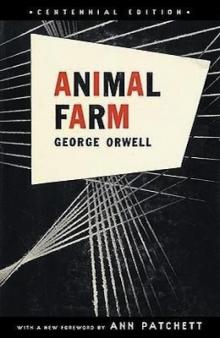 Animal Farm & 1984
Animal Farm & 1984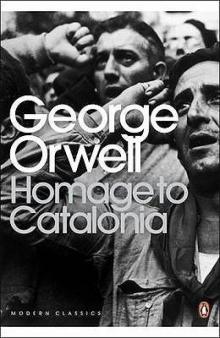 Homage to Catalonia
Homage to Catalonia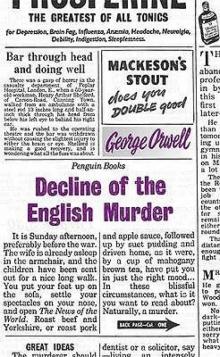 Decline of the English Murder
Decline of the English Murder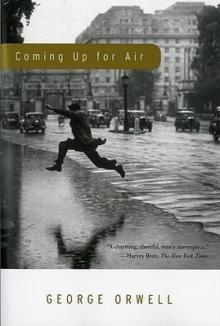 Coming Up for Air
Coming Up for Air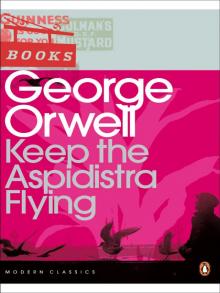 Keep the Aspidistra Flying
Keep the Aspidistra Flying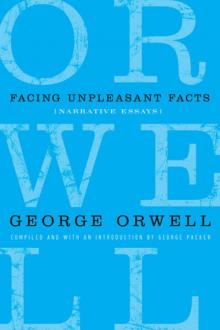 Facing Unpleasant Facts: Narrative Essays
Facing Unpleasant Facts: Narrative Essays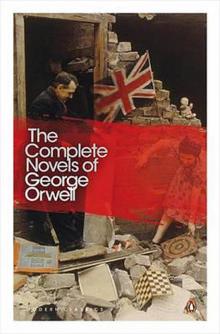 The Complete Novels of George Orwell
The Complete Novels of George Orwell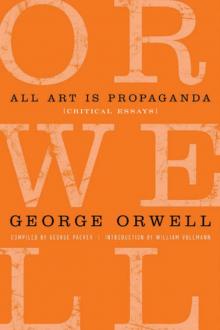 All Art Is Propaganda: Critical Essays
All Art Is Propaganda: Critical Essays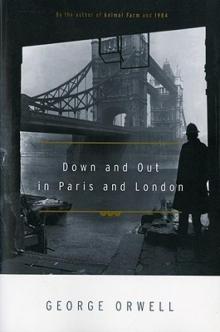 Down and Out in Paris and London
Down and Out in Paris and London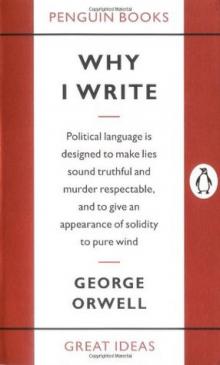 Why I Write
Why I Write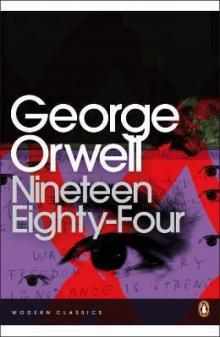 Nineteen Eighty-Four
Nineteen Eighty-Four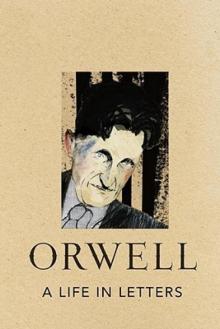 A Life in Letters
A Life in Letters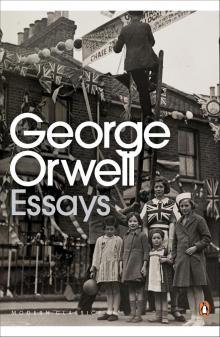 Essays
Essays A Clergyman's Daughter
A Clergyman's Daughter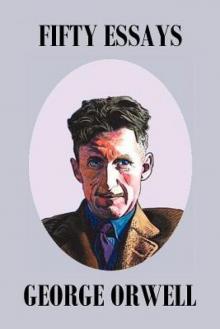 Fifty Orwell Essays
Fifty Orwell Essays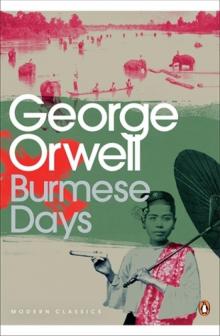 Burmese Days
Burmese Days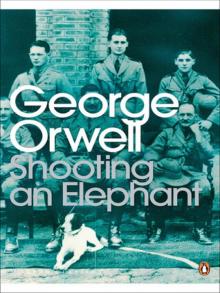 Shooting an Elephant
Shooting an Elephant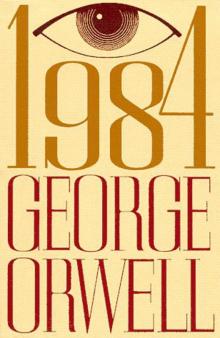 1984 (Penguin)
1984 (Penguin)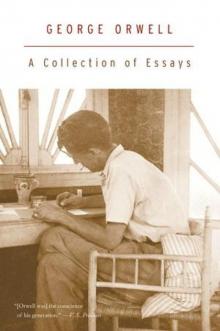 A Collection of Essays
A Collection of Essays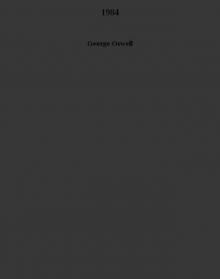 1984
1984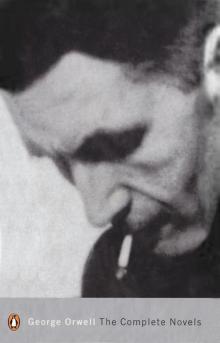 The Complete Novels
The Complete Novels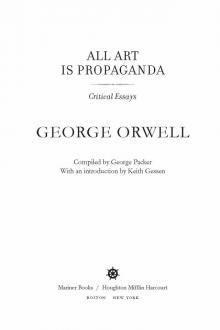 All Art Is Propaganda
All Art Is Propaganda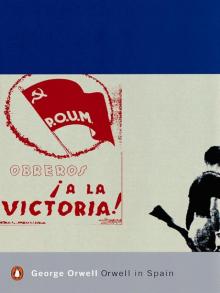 Orwell in Spain
Orwell in Spain Animal Farm: A Fairy Story
Animal Farm: A Fairy Story Animal Farm and 1984
Animal Farm and 1984